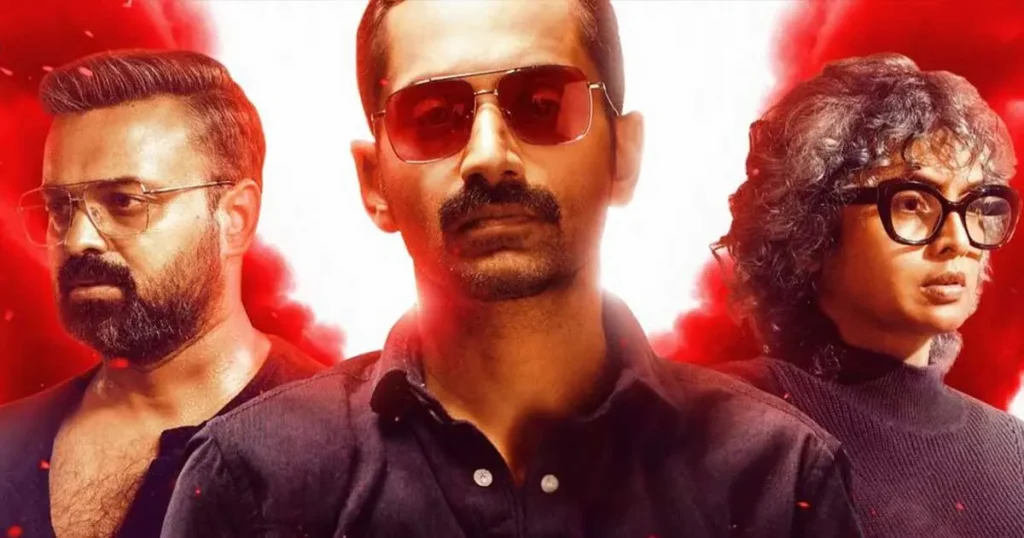For the most part, this is a quiet, subtle drama that turns into a detective story. The general feeling of us piecing together things just as the protagonist’s mind pieces them together is beautifully done. The rest of this review may contain spoilers…
Amal Neerad follows up his very macho Bheeshma Parvam with the very delicate Bougainvillea, which marks Jyothirmayi’s return to the big screen after a long absence. She is fantastic. She plays Reethu, a woman with some kind of amnesia. She notes things down in a diary or else on scraps of paper, so that she knows basic facts: say, that she has two young children, who seem to have been born late. This observation comes from Reethu’s salt-and-pepper hair. Jyothirmayi plays this character with just the right amount of confusion, without overdoing the spaced-out expressions. Even with her minimalistic gestures and looks, you can sense her unsureness. You can sense her mind slowing down to process who this person is or what happened earlier in the day. In the opening scene, we hear the Kishore Kumar hit “Neele neele ambar par…” It is in sync with the serene blueness of Reethu’s world. From her rocking chair to her clothes, that is the dominant colour.
The film is based on a story by Lajo Jose, and the title comes from the flowers Reethu likes to paint almost obsessively. Kunchacko Boban plays Reethu’s husband Royce, who’s a doctor. The actor is wonderful as a mountain of patience. Royce is excellent at handling patients, and he is equally at home handling Reethu. It cannot be easy. Another man might have a room with a punching bag to vent out his frustrations. The director follows Royce’s example, and until the last half-hour or so, he rarely amps up the drama. There is a revelation about the lady who takes care of Reethu (Srinda, who’s lovely). There is a revelation about Reethu’s children. These developments could have been played at a high pitch to give the audience a jolt. But Amal keeps things quiet, subtle. The film’s tone is like Royce’s gently reassuring voice, backed by a lovely Sushin Shyam score.
For a while, the film takes its time rooting us in Reethu’s condition. We get to spend time with Royce in his farmhouse, where he likes to have a drink every weekend and unwind with self-help books. And then, again gradually, there’s a change in direction: from a domestic drama, we switch to a detective story. Fahadh Faasil enters Reethu’s and Royce’s calm life, and starts asking questions about a missing teenager. This is essentially a guest role for Fahadh, and he’s good, as always, especially in the scene where he phones his significant other (I wasn’t sure if they were married). His character is everything that Reethu and Royce are not. He is blunt. He raises his voice. He is impatient. He thinks Reethu knows something, and he wants answers – even if it means putting her under pressure, demanding that she pull out something from her amnesiac mind.

And slowly, the external world creeps in on Royce and Reethu’s calm domesticity. We get a thief. We get a bunch of technicians installing a security camera. We hear about a missing bracelet. We get Veena Nandakumar as a criminologist. Through these transitions, Anend C Chandran’s camerawork is brilliant, balancing the soothing blues of Reethu’s universe with the angry yellows that come later. The earlier images are softer. The latter images are harsher. The screenplay keeps giving us information after the events happen, and that keeps us off-balance. It’s as though we are getting a glimpse of these events through Reethu’s hazy mind. Even when you begin to suspect someone, you wonder what the reason could be. There doesn’t seem to be a clear motive. We wait for Reethu’s mind to give us information about that missing girl – that is, if she does indeed know something about that missing girl. This general feeling of us piecing together things just as Reethu’s mind pieces them together is beautifully done.
And then, we get a hint about who the villain of the story is. It involves a terrific concept about the person used as bait. But this big reveal happens too soon, and the film’s final stretch transforms into a third sub-genre: from domestic drama to detective story to… this! We get an underwhelming flashback that tries to “explain” why people become a certain way. Do we need explanations? Can’t someone just be a bad person without a reason? Or at least, there needed to be a meatier reason. I love pulp fiction as much as the next person. But the last few scenes come with a total change of tone, with slo-mo sensationalism – and this portion did not work for me. We’ve seen this sort of thing too many times. But what we haven’t seen is a woman relying on her unstable memory and her instinct. The film may have undergone a tonal change, but Jyothirmayi remains in character throughout. Bougainvillea is a relatively unusual entry in this genre. Flaws and all, mind games are always fun!


